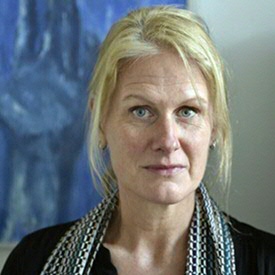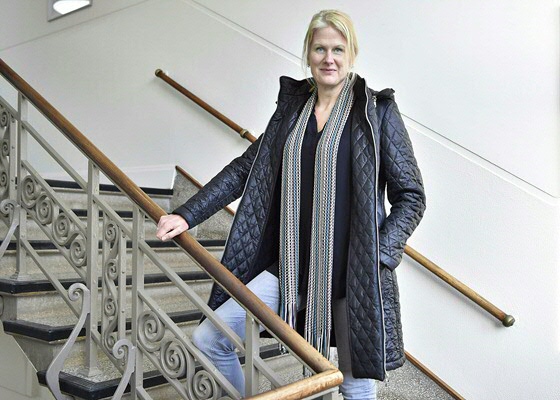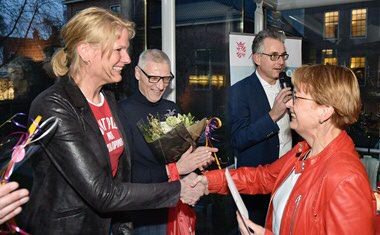‘We are stuck in a “disorder mindset”’
She has written a book, Hoe voorkom je ADHD? Door de diagnose niet te stellen (How can ADHD be prevented? By not diagnosing it). She organized Festival Apaart, for more tolerance for people who are ‘different’. And she has also developed a plan for children’s birthday parties for the whole class. All of these activities typify psychologist Laura Batstra.
Text: Martin Althof, Communication UG / Photos: Elmer Spaargaren

ADHD and the brain
During the recent Lecturer of the Year elections, Batstra began her short lecture with a news item from Radboud University from 2017: ‘ADHD can be seen in five regions in the brain; large international study confirms differences.’ This was a ‘spectacular’ result that was soon picked up by the media. However, if you analyse the study’s results, you find that there are just miniscule differences at the group level. Batstra: ‘A better heading would have been “Incredibly expensive brain study finds minimal difference between brains of people with and brains of people without an ADHD diagnosis”. This kind of research gives people the impression that ADHD is a brain disorder, whereas there is nothing to see on the scans. And even if there was something, it still would not make it a disorder. If we “see” homosexuality in the brain, that doesn’t suddenly make it a disorder.’
Vested interests
According to Batstra, too many parties have vested interests in clear-cut, dramatic conclusions: researchers, academic journals, the media and, of course, the pharmaceutical industry. ‘We treat disorders with medicine, and ADHD studies that are commissioned by the pharmaceutical industry signal a biomedical, chronic illness, while claiming that medication works and that there are few side effects. Independent researchers, however, conclude that pills do not work as well as is claimed, and that there are more side effects.’

Children are the victims
This biomedical mindset that has developed in recent decades means that children who may have difficulties with the demands that society makes of them are now labelled as having a brain disorder. Increasingly, therefore, the child is seen as the cause of the problem. Batstra is keen to emphasize that ‘we are stuck in a “disorder mindset”’. She believes that too many children are labelled as having a disorder, and that the causes of and solutions to the problematized behaviour are too easily attributed to the child and their parents. Batstra: ‘The child may then start acting as though that is the case. In my opinion, we need to pay much more attention to societal and environmental factors.’
Poverty and the achievement society
Batstra certainly does not deny that some children experience serious difficulties and that they require specialized care and can benefit from medication. However, many more children would benefit from being helped in a different way. Batstra: ‘In my opinion, behaviour is always a result of many different factors. For example, poverty and social exclusion are very strongly associated with mental and behavioural problems. But try to solve poverty – that’s pretty complicated. Another factor is the achievement society in which we live. There is a lot of pressure, and school performance and getting a diploma are crucial to a child’s future, so I understand how parents feel. They want their child to do well, and if someone tells them that a Ritalin pill can help…. By the way, we have known for more than ten years that Ritalin does not help children to do better at school, and recent studies continue to confirm this. Unfortunately, the people affected rarely get to hear about these “negative” research results.’
Criticism
When Batstra’s book on ADHD was published in 2012, she received a fair amount of criticism: from psychiatry professors to parents and also via social media. Batstra: ‘I saw then how sensitive a subject ADHD is, certainly for parents who have chosen to go along the path of diagnosis and medication for their children. Some parents, however, were able to talk to me about the effect that my ideas had on them. I am grateful to those parents, because from them I have learned that, while I criticize the over-prescription of Ritalin, I should also mention and recognize that there are also children and families who benefit from it. I assume that the parents know their child better than anyone else, and that they know which treatment best suits them and their child. Of course, this is assuming that they have been honestly informed about the advantages and disadvantages of diagnosis and psychiatric treatment, which is not always the case.’

Druk & Dwars
Batstra is trying in her own way to contribute to a better society in which fewer children are left behind and no-one is excluded. She has set up a project called Druk & Dwars (Wild & Wilful), which aims to change people’s perceptions of hyperactive, wilful behaviour, and provide parents and professionals with the help that they need to improve support for children. Batstra: ‘People need good information to counter the persistent diagnostic mindset. Our PhD student Sanne te Meerman has examined how academic textbooks deal with ADHD, and she found that the information in them has a strong biomedical accent. This means that we have a long way to go.’ Batstra is convinced that local initiatives can make a difference: ‘For example, we have come up with a plan to organize more children’s birthday parties for the whole class, so that no-one is left out. That means also inviting the less popular, atypical children who usually would not be allowed to attend. And it works! It is a fantastic way of teaching young children that no-one should be excluded.’
Should we accept poverty in society?
It is 2020, but 9% of Dutch children still grow up in poverty. Batstra notes that the government and the more well-off tiers in society come up with all kinds of ways of fighting and easing poverty, from a one-off voucher for each child to food banks. Batstra: ‘The intention is there, but at the same time it is inhumane. First, the political system creates a society in which poverty exists, and we all accept it. Then, poor people need to prove that they are poor enough to fall under a certain regulation and be given something extra. It is humiliating and leads to shame, with all the consequences that that has, also for children. Instead of giving money to the poor, the government needs to do something about the underlying causes. For example, while the average income has increased in recent years, the minimum income has not, and neither have sickness and social security benefits. There must be something we can do!’
Further information
- More on Laura Batstra
- Klassenfeestjes
- Druk en Dwars
More news
-
03 February 2026
‘Such willpower’
-
20 January 2026
Alcohol, texting, and e-bikes
-
13 January 2026
Lonneke Lenferink joins The Young Academy
